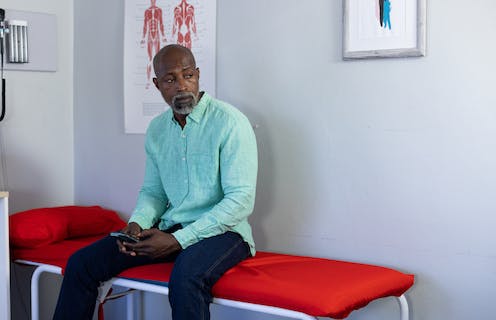
Anti-Black racism continues to be a major determinant of poor health and social outcomes for Black Canadians. Addressing this racism within Canadian institutions — like the health-care system, justice system, the child welfare system and education — has far-reaching implications.
The COVID-19 pandemic is a good example. Black populations had the highest age-standardized mortality rate among racial groups in Canada. Moreover, in the early days of the pandemic, living in a Black community was strongly correlated with a diagnosis of COVID-19. Black Canadians also have a higher mortality rate from HIV, diabetes and several forms of cancer.
The Canadian Race Relations Foundation describes anti-Black racism as “policies and practices…that mirror and reinforce beliefs, attitudes, prejudice, stereotyping and/or discrimination towards people of African descent.”
As a Canadian Black academic and a parent of two young children, I know that anti-Black racism has real-world consequences. Research reveals that Black children and youths are overrepresented in the criminal justice and child welfare systems, and have lower post-secondary school completion rates.
Read more:
Recognizing history of Black nurses a first step to addressing racism and discrimination in nursing
Historically, Black people in Canada were denied enrolment in medical schools and nursing schools, which has had long-term impacts on the provision of culturally sensitive health care.
Table of Contents
Contemporary and historical inequities

(Shutterstock)
Black Canadians’ experiences are rooted in contemporary and historical inequities, including Canada’s history of slavery and racial discrimination. Canada’s early immigration policies were racist, such as Section 38 of the Immigration Act of 1910, which:
“prohibited for a stated period, or permanently, the landing in Canada, or the landing at any specified port of entry in Canada, of immigrants belonging to any race deemed unsuited to the climate or requirements of Canada, or of immigrants of any specified class, occupation or character.”
It was further proposed that “the Negro race…is deemed unsuitable to the climate and requirements of Canada.”
Findings from my research are consistent with the United Nations Report of the Working Group of Experts on People of African Descent on its mission to Canada, which affirmed the negative legacy of these past practices. Policy formulations still shape access to material resources and contribute to structural inequities in Canada, evident in the pervasive low incomes of Black Canadians.
While median annual wages generally increase for the Canadian population, Black men’s wages have remained stagnant. Economic deprivation and employment barriers informed by anti-Black racism also have generational consequences. Significantly, Black children (and Filipino children) are the only two groups of children that on average do not surpass their parents’ levels of education in Canada.
As well, many Black immigrant women, especially from Western and Central Africa, experience high levels of poverty despite their high educational achievements, often acquired prior to coming to Canada.
Black youth mental health
Black youth spoke most about racism in our research on their mental health experiences. They internalize racism, which in turn affects their future well-being. We learned that numerous factors intersect to create challenges. For example, Black youth are often perceived as guilty of unacceptable behaviours and must prove themselves innocent. The prevailing perception that toxic or unhealthy masculinity is an attribute of Black men also affects their mental health.
Read more:
Black men’s mental health concerns are going unnoticed and unaddressed
Income inequality and insufficient financial resources are complicating factors, impeding many young Black men from getting the counselling they need to improve their mental health. When they do access such supports, lack of diversity among providers and culturally appropriate services can be further barriers. LGBTQIA+ Black youth may face dire situations, experiencing racism within the LGBTQIA+ community and homophobia within the Black community.
Addressing inequities
Partnering with Black communities is a crucial component in effective efforts to mitigate inequities. Indeed, it is essential that Black community members participate, to capitalize on their strengths and actively engage in improving their well-being.
Through my personal and professional experiences, I’ve had a unique glimpse into the brilliance and strengths of various Black communities, which are often untapped. These includes a collectivist orientation, spirituality and the value of respect. Mentorship within these communities has also produced several unique gains. For example, my participation in the University of Toronto Summer Mentorship Program in my early years in Canada, contributed to my success. I have also created a Black Youth Mentorship and Leadership Program to socially and economically empower Black youth to contribute to the society. Around 150 Black youth have been trained.
Several other mentorship programs exist in Black communities and some, as indicated above, were created by Black faculty members and administrators in educational institutions.
Institutions must do more than just provide education and develop anti-racist policies; they must also ensure accountability in addressing racism. Embedding anti-racism practices in evaluation at all levels is an important step, especially since many professions in Canada don’t include anti-racism as a required competence. Such changes will support improved social and health outcomes overall.
Collecting race-based data is still not that common, but as this practice becomes more widespread, the data will tell us more about the ongoing social and health outcomes of Black Canadians. My aim is to help all Canadians understand that anti-Black racism in our country does not exist in isolation; it intersects with many other aspects of people’s lives. Race-based data is a step towards better understanding these relationships.
Looking ahead
Anti-Black racism has health, social and economic consequences for Black populations in Canada. We are a growing population in Canada of approximately 1.5 million individuals who self-identify as Black, accounting for 4.3 per cent of the country’s total population.
However, anti-Black racism has consequences for population outcomes for all Canadians, as we saw during the COVID-19 pandemic. It is key that we provide mentorship, collect race-based data, take strength-based participatory research approaches and establish and maintain accountable practices that centralize race and its intersections.
These moves will improve health and social outcomes for Black Canadians and generate stronger population outcomes in Canada.
![]()
Bukola Salami receives funding from Policywise for Children and Families for a project on mental health of Black youth named in this article
























